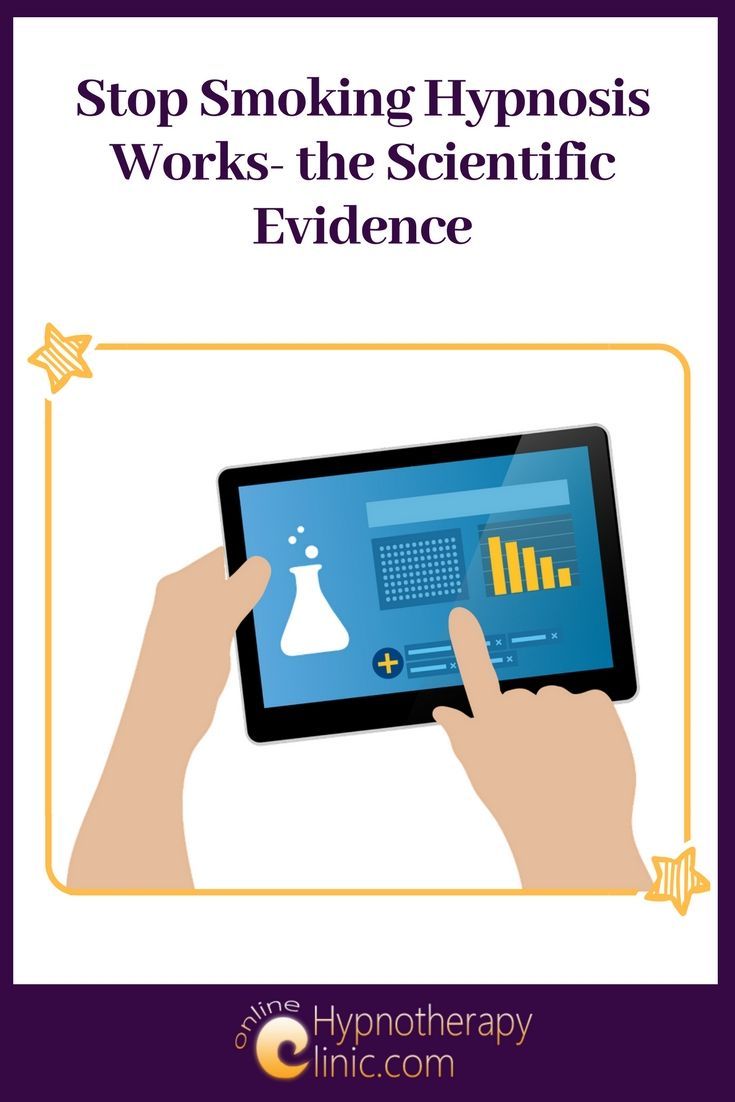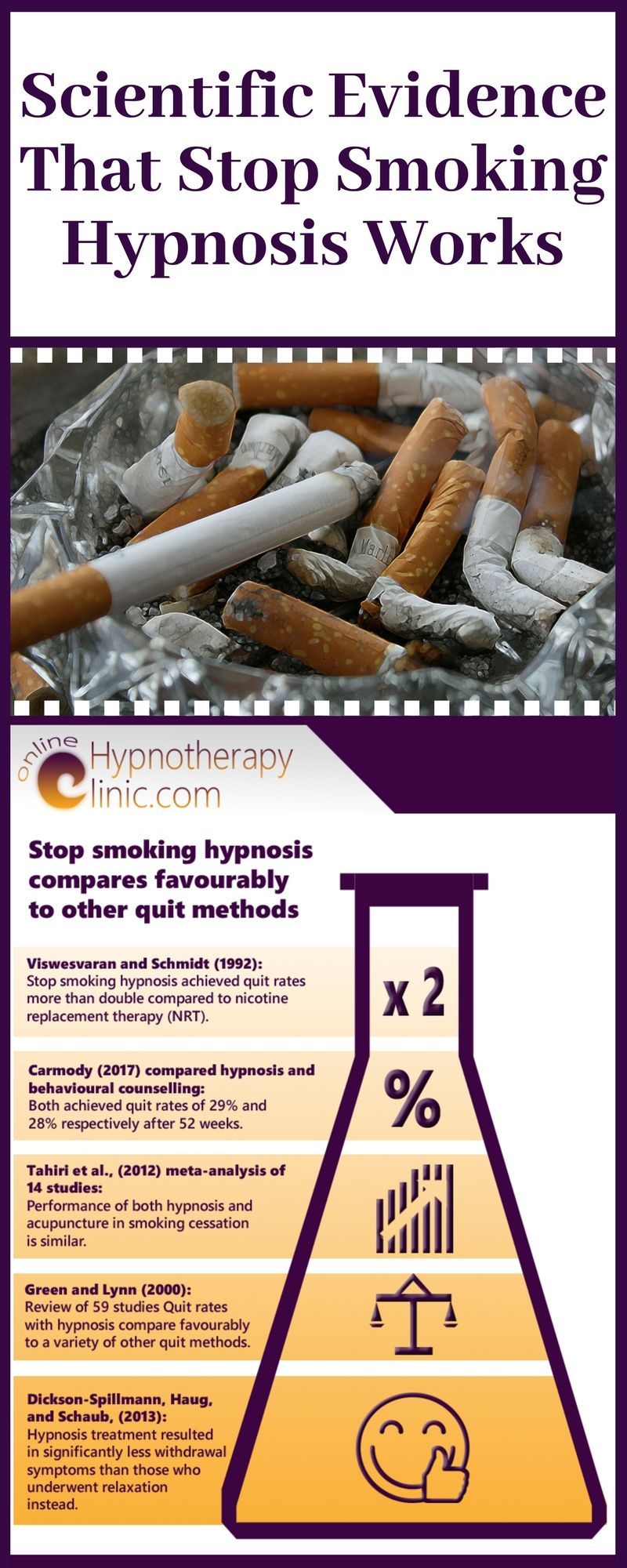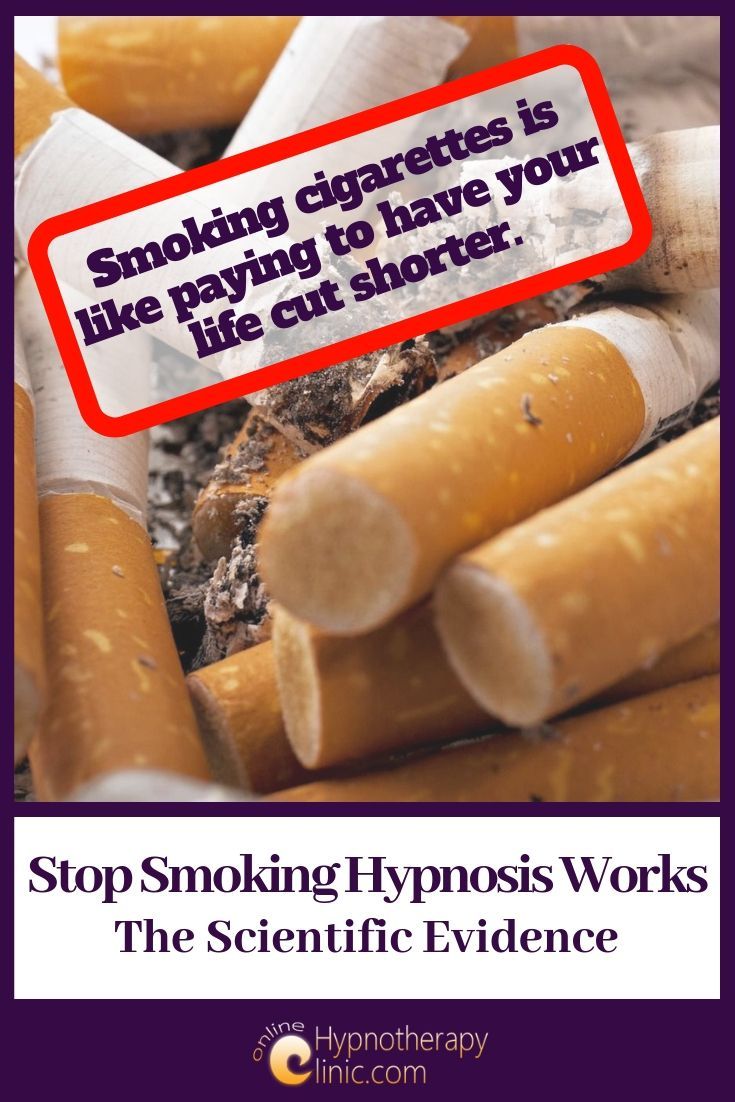Stop Smoking Hypnosis Works- the Scientific Evidence
By Susanna Sweeney, MSC, MBACP, CHT
"Is there any scientific proof that stop smoking hypnosis works?" is a question I have often been asked. I’d imagine you might have asked this question, too.
A lot of people quit smoking successfully and change their lives with hypnotherapy every year. Yet there are a lot of skeptical articles written on hypnotherapy to quit smoking, such as this example here in WebMD.
There are a lot of claims online, even in big publications, that there is no, or not sufficient scientific evidence that stop smoking hypnosis works. Therefore, on this page I want to create a balance and introduce you to the available scientific evidence that hypnosis for smoking does work.
There is little research available on stop smoking hypnosis
Here comes the caveat. To start with, it has to be said that hypnosis as a whole
may be one of the most under researched areas in psychology. There is
very little research available on hypnosis in clinical practice, and very, very little on hypnosis to stop smoking. Why is this so?
The main reason
I believe this is so is simple. Research requires funding. And for
funding to go into research there must be a will to invest. Why would
there be a will to invest? Only, if you have a valuable, highly profitable product that can be mass produced, which can be marketed using the findings of that research you invest in.
In the case of smoking cessation this applies to medication and other replacement products.
These are huge pharmaceutical markets. You’ve got big players like
Pfizer, Glaxo Smith Kline, Takeda, Cipla, or Novartis with huge profit
margins that allow investment in research. This article from 2015
identifies the size of the global nicotine replacement market as 2.4
billion Dollars.
Hypnotherapy to quit smoking, meanwhile, does not make for such a product. Think about it- who earns money practicing hypnosis? Only the individual practitioner.
And that’s in a nutshell why I believe the area of hypnosis to quit smoking is under researched.
Research on nicotine replacement therapy (NRT) put in context
While hypnosis for smoking is under researched, there is a lot of research available on nicotine replacement products. I want to devote a couple of paragraphs to that because I think it will help you to see the full picture.
While some studies on NRT show favourable quit rates, there are other studies that are critical of NRT:
- Walsh (2008) in conducting a review of 12 studies on over the counter NRT identified huge methodological issues in those 12 studies. This led him to conclude that the claim of superior effectiveness of NRT is questionable.
- Alpert, Connolly and Biener (2013), found that the use of NRT had no impact at all on relapse rates in a sample of 787 smokers.
Interestingly,
these more critical studies cited here received a speedy rebuttal by a
group of academics (Hughes et al, 2012). Reading through the rebuttal, the ‘declarations of interest’ at the end of the article stands out: two of the academics involved declared financial links to the NRT industry.
Why am I bringing this up?
The main points I want to bring across here are that:
- While a lot of studies have found in favour of NRT, there are also those that don’t.
- There will always be complex ethical issues when large industry groups fund research as opposed to research being conducted by independent experts.
My hope is that these two points I am making here will help you to critically examine research findings.
Having set the scene and given you a more complex backdrop to the existing research on stop smoking hypnosis, it’s now time to move on to some actual research findings.
Research findings on quit rates with stop smoking hypnosis
Most existing research studies on hypnosis for smoking starting from as far back as the 1970ies have found quit rates of between 15% (comparable to other quit methods) and 87% (extremely high for any smoking cessation technique).
Here are some examples:
- Viswesvaran and Schmidt (1992) found stop smoking hypnosis to have quit rates of 36%, which was almost three times higher than the performance of nicotine replacement therapy
- Sorensen et al (1995) examined the use of stop smoking hypnosis and found quit rates of 15% that were comparable to other cessation methods examined.
- Ahijevych, Yerardl and Nedilsky, (2000) reported a quit rate of 22 % in a sample of 452 smokers participating in a one session program to quit smoking with hypnosis.
- Wynd (2005) identified quit rates of 26% in those undergoing a guided imagery hypnosis program at 24 months follow-up.
- Elkins et al (2006) examined the effects of a 2 months hypnotherapy quit program. Quit rates were confirmed by carbon monoxide testing (a breath test) and were found to be 40% at the six months follow up.
- Johnson and Karkut (1994) reported quit rates of 87% in a stop smoking hypnosis program at 3 months follow up.
- In a more recent study from Egypt, Mohamed & EIMWafie ( 2014), researchers examined the effects of hypnotherapy on smoking cessation in secondary school students and found quit rates to be 65.4% after a nine week program.
How does stop smoking hypnosis perform compared to other smoking cessation methods?
Stop smoking hypnosis achieves quit rates more than double of those of nicotine replacement therapy (NRT)
Viswesvaran and Schmidt (1992) compared quit rates across different cessation methods. Hypnosis program participants had quit rates of 36% compared to 16% quit rates with nicotine gum, and 18% with medication, and 7% with physician advice. The only category that scored higher than hypnosis were cardiac patients who had been told they must stop smoking, with a success rate of 42%.
Performance of both hypnosis and acupuncture in smoking cessation is similar , while aversion based treatments could not be confirmed to be effective.
Tahiri et al (2012) carried out a meta-analysis of 14 studies. 4 studies were on stop smoking hypnosis, 6 studies on acupuncture to stop smoking, and 4 on smoking cessation methods based on aversion. Both hypnotherapy to quit smoking and acupuncture performed well as quit methods while the effectiveness of aversion based treatments could not be confirmed.
Hypnosis compares favorably to a variety of other quit methods
In a review of 59 studies Green and Lynn (2000) found hypnosis to have quit rates comparable to a variety of non-hypnosis based treatments and classified hypnotherapy to quit smoking as a possibly efficacious” treatment for smoking.
Hypnosis results in less withdrawal symptoms than behavioral counseling
Dickson-Spillmann, Haug, and Schaub, (2013) compared the use of hypnosis to relaxation in smoking cessation. The researchers found that while both treatments resulted in similar quit rates of 15-18%, hypnosis treatment resulted in subjects experiencing significantly less withdrawal symptoms than those who underwent relaxation instead, while both treatments resulted in similar quit rates.
Similar performance of stop smoking hypnosis and behavioral counseling in relapse prevention
Carmody (2017) compared hypnosis and behavioral counseling as methods for relapse prevention in a sample of 286 current smokers and found quit rates of 29% for hypnosis and of 28% for behavioral counseling at the 52 week follow up.
I hope this overview of the available research findings on stop smoking hypnosis has helped you to see that hypnosis is a viable form of therapy, and is a far cry from being the 'mumbo-jumbo' it is often portrayed to be.
More About Stop Smoking Hypnosis
Stop Smoking Hypnosis Science
Is hypnosis just a bunch of mumbo jumbo, or is there is any science behind it at all?
Is Hypnosis the Right Quit Method for You?
Hypnotherapy to Quit Smoking- 12 Ways to Know if it is Right for You
Find
out how you could benefit from hypnotherapy to quit smoking. Twelve
qualities of stop smoking hypnosis that make hypnosis probably the best method to quit smoking.
How You can get the Very Best out of Your Treatment When You Quit Smoking With Hypnosis
Quit Smoking Hypnotist- 9 Things you Should Consider Before You Book
Read
this if you want to be in a position to make informed choices about
which quit smoking hypnotist to chose. Some of these tips are likely to
surprise you.
Hypnosis for Smoking Programs- 10 Things You Should Know
What
exactly is a program of hypnosis for smoking? Most people don't know.
Find out what to look out for in a program and what to expect from your
hypnosis sessions.
Quit Smoking by Hypnosis- 11 Tips to get the Best Out of Your Treatment
Clear
up some common misconceptions and misunderstandings some people have
around stop smoking hypnosis so that you won’t make the same mistakes
and can be empowered to get the very best out of your treatment.
How You Can Benefit From Quit Smoking Hypnosis Without Ever Visiting a Hypnotist
Self Hypnosis to Stop Smoking - 13 Benefits You can Expect
Why use self-hypnosis over attending a quit smoking hypnotist? Find out the benefits of self hypnosis.
Self Hypnosis for Smoking- Your Questions Answered
What exactly is self hypnosis for smoking and what is involved? Your questions answered.
Best Free Stop Smoking Hypnosis
Benefit from our FREE stop smoking hypnosis session!
Want to Quit Smoking, but Concerns About Weight Gain are Holding You Back?
Quit Smoking Without Gaining Weight- Yes You Can
This
article explains the connection between smoking cessation and weight
gain, and guides you how to overcome the challenge of with ease.
I hope this brief article on the science behind stop smoking hypnosis has helped you to understand the topic a little better. In the comments underneath, let our community know how your views on stop smoking hypnosis have changed as a result.
You can learn more about smoking cessation and hypnosis in my other articles that I linked to above. Enjoy the read!
Here is to your health and well being.
Regards,

References:
Ahijevych, K., Yerardl, R. and Nedilsky, N., 2000. Descriptive outcomes of the American Lung Association of Ohio hypnotherapy smoking cessation program. International Journal of Clinical and Experimental Hypnosis, 01 October 2000, Vol.48(4), p.374-387
Alpert, Connolly, Biener, 2013. A prospective cohort study challenging the effectiveness of population-based medical intervention for smoking cessation. Tobacco Control, January 2013, Vol. 22 (1).
Carmody TP, Duncan C, Simon JA, et al. Hypnosis for smoking cessation A randomized trial. Nicotine & Tobacco Research, 2008, Vol. 10(5)
Dickson-Spillmann, M., Haug, S. and Schaub, M.P., 2013. Group hypnosis vs. relaxation for smoking cessation in adults, a cluster-randomised controlled trial. BMC public health, 13(1), p.1227
Elkins, G., Marcus, J., Bates, J., Hasan Rajab, M. and Cook, T., 2006. Intensive hypnotherapy for smoking cessation: A prospective study 1. Intl. Journal of Clinical and Experimental Hypnosis, 54(3), pp.303-315.
Green, J.P. and Lynn, S.J., 2000. Hypnosis and suggestion-based approaches to smoking cessation. an examination of the evidence. International Journal of Clinical and Experimental Hypnosis, 01 April 2000, Vol.48(2), p.195-224
Hasan et al 2014. Hypnotherapy is more effective than nicotine replacement therapy for smoking cessation. Results of a randomized controlled trial. Complementary Therapies in Medicine, February 2014, Vol.22 (1)
Hughes, John R. ; Cummings, K. Michael ; Foulds, Jonathan ; Shiffman, Saul ; West, Robert, 2012. Effectiveness Of Nicotine Replacement Therapy—A Rebuttal. Addiction, August 2012, Vol.107(8), pp.1527-1528
Johnson, D. L., & Karkut, R. T., 1994. Performance by gender in a stop-smoking program combining hypnosis and aversion. Psychological Reports, 75,851-857.
Mohamed & EIMWafie, 2014. Effect of hypnotherapy on smoking cessation among secondary school students. Journal of Nursing Education and Practice, Vol. 5, No. 2.
Sorensen, G., Beder, B., Prible, C.R. and Pinney, J., 1995. Reducing smoking at the workplace: implementing a smoking ban and hypnotherapy. Journal of occupational and environmental medicine, 37(4), pp.453-460.
Tahiri, M., Mottillo, S., Joseph, L., Pilote, L. and Eisenberg, M.J., 2012. Alternative smoking cessation aids: a meta-analysis of randomized controlled trials. The American journal of medicine, 125(6), pp. 576-584.
Viswesvaran, C., & Schmidt, F. L. 1992. A meta-analytic comparison of the effectiveness of smoking cessation methods. Journal of Applied Psychology, 77(4), 554-561.
Walsh, R., 2008. Over-the-counter nicotine replacement therapy, a methodological review of the evidence supporting its effectiveness. Drug and Alcohol Review, September 2008, Vol. 27( 5), p. 529
Wynd, 2005. Guided Health Imagery for Smoking Cessation and Long-Term Abstinence. Journal of Nursing Scholarship, September 2005, Vol.37(3), pp.245-250
Recent Articles
-
Havening Technique Training auf Deutsch
Apr 18, 25 02:59 AM
Havening Technique Training auf Deutsch- Details und Buchung -
Client Testimonials
Oct 06, 23 06:08 AM
Client Testimonials of my Online REPAIRenting® Program that uses various psychosensory approaches for safe and quick transformation -
Smoke Free Thanks to This Amazing Resource
Aug 02, 23 09:26 AM
Oh thank you for this simple resolution to all my worries! I feel like I have had a weight lifted off my shoulders. It is like cheating on giving up smoking.





New! Comments
What do you think? Leave a comment in the box below.